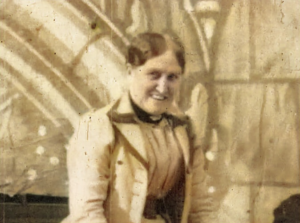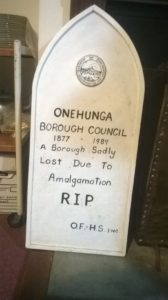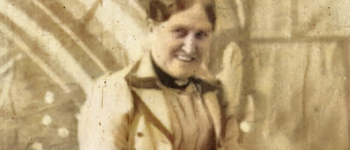1893: Her Worship Elizabeth Yates
November 29, 2023
By AHNZ

Her Worship Elizabeth Yates took office as Mayor of Onehunga borough on 16 January 1894 having been elected 29 November 1893. New Zealand had annual mayoral elections back then and Yates did not win a second term. However, she did come back as councilor for two terms between 1899 and 1901. Yates had stepped up after her husband and previous Onehunga Mayor Captain Michael Yates paved the way.
In the world history of women mayors only Susanna Salter preceded Yates. She was also a 1 term mayor from 1887-88 but in the “city” of Argonia, Kansas, populated by less than 400. Ref. Wiki
Yates was still the first women mayor in the British Empire and first to be elected deliberately. Salter was nominated without her consent as a sort of political ploy that back-fired on the Kansan intriguers when she ended up winning. Susanna found out what had happened while in the process of hanging out the family washing. Ref. Devaliant (1996)
The old 1860 brick blockhouse served as Onehunga Borough Council Chambers from 1889-92 according to a brass plaque within. That suggests that the Onehunga Borough Council Chambers in Queen Street was either newly built or renovated when Yates’ Council took its seats. A far more impressive and roomy space to feel important in. Ref. Onehunga Public Library Collection, Auckland Libraries
Elizabeth migrated to New Zealand with her army family as Fencible Settlers on 11 December, 1852, at the age of 7. It was the last of the 10 ships. So, Elizabeth’s was one of founding families that created the Fencible villages. In a Family System with no sons, especially a military, patriarchal one, the eldest daughter tends to step into those shoes. Growing up in army towns as the textbook ‘army brat’ also explains a lot about the woman who became the confident, practical, leader of Onehunga. Ref. graveinsightsonehunga.nz
Her father, George Oman, died in 1874. Elizabeth married Captain Yates in 1875. It may be that Yate’s had a co-dependent personality and couldn’t flourish without a male figure in her life such as her father or, when he was gone, her husband. Yates always said she took office only because her husband was too sick to do so. She used the corporate “we” rather than “I” when she spoke about standing for office “to carry out the views we considered right.” She never did anything without consulting him and said she was “something like his mouthpiece.” Ref. p57, Devaliant (1996)
In protest at Yates’ taking office “The town clerk and four councilors resigned; fire brigade volunteers handed in their helmets.” – Makers of Auckland, NZ Herald (1971)
When the councilors who resigned tried to take their seats at the council meeting anyway they were told by the Lady Mayor to get lost! Ref. Thames Star (1893,) Papers Past
 She had a rough go with the Onehunga patriarchy and the international ‘tabloid’ press fussing over the novelty of her administration. Transcripts show that Elizabeth was completely unruffled, witty, and eloquent with a flourish. So does the film from 1900. However, she had a tactlessness that bruised her civilian council’s egos. In the army community, and on Captain Yates’ deck, a chain of command and a rank do some heavy lifting for interpersonal relations. I think Elizabeth was socialised to fit that sort of world that Onehunga and New Zealand had been in her adult years. Now in mid-life, and in the radical ‘Woke’ 1890s, this wasn’t in step with the times.
She had a rough go with the Onehunga patriarchy and the international ‘tabloid’ press fussing over the novelty of her administration. Transcripts show that Elizabeth was completely unruffled, witty, and eloquent with a flourish. So does the film from 1900. However, she had a tactlessness that bruised her civilian council’s egos. In the army community, and on Captain Yates’ deck, a chain of command and a rank do some heavy lifting for interpersonal relations. I think Elizabeth was socialised to fit that sort of world that Onehunga and New Zealand had been in her adult years. Now in mid-life, and in the radical ‘Woke’ 1890s, this wasn’t in step with the times.
Yates is reported as having done wonders for the borough’s balance sheets and essential infrastructure during her term. Various sources repeat the claim that she was the first woman to vote in the General Election when women’s suffrage was restored in 1893. But as Timespanner sceptically puts it: “Really?? How on earth did whoever compose the wording for this sign come up with the “fact” that Elizabeth Yates was not only the first woman mayor, but somehow voted ahead of every other woman in the country? Most odd.” Ref. Commemorating Elizabeth Yates, Timespanner (2012)
The Feminists try to claim Yates but she made it quite clear, as did her obituary, that she was never one of them. I think it dehumanises Kiwis to reduce our ambitions and achievements not to the individual men and women but to their perceived affiliations. It’s a particularly Identity Political point of view to assume that everyone is just a brain-dead MAORI.exe or GAY.exe file striving to serve the greater good of whatever ethnic/racial/gender/etc partisan group they’re supposed to be a part of.
Yates wasn’t having it. No hood ornament, Elizabeth was living her own life by her own merits. She had ideas about being mayor that were her own and she earned her own place; She was not a Diversity Hire. This business of claiming other people’s achievements as belonging to one’s own preferred in-group is Collectivist, possessive, thinking belonging to a tribal and Medieval mind.
 Nor is it true that Yates benefited from Feminism or the Suffragettes for making her election possible. It happened to coincide with Womens’ Sufferage in September 1893. However, as Devaliant (1996) points out “she was taking advantage of a privilige which had existed for years. The Municipal Corporations Act of 1876 gave women property owners and ratepayers the right to vote and stand in local body elections 17 years before they got the parliamentary franchise, and 43 years before they won the right to sit in parliament.” What Yates had done had been allowed for over a generation.
Nor is it true that Yates benefited from Feminism or the Suffragettes for making her election possible. It happened to coincide with Womens’ Sufferage in September 1893. However, as Devaliant (1996) points out “she was taking advantage of a privilige which had existed for years. The Municipal Corporations Act of 1876 gave women property owners and ratepayers the right to vote and stand in local body elections 17 years before they got the parliamentary franchise, and 43 years before they won the right to sit in parliament.” What Yates had done had been allowed for over a generation.
Captain Yates died in 1902. Now aged 62, Elizabeth had no children and no man to look to for the first time in her life. It was an existential crisis she could not extract herself from and she turned to drink and madness. “Cast off from the council and widowed, Yates began to drink. Ravaged by alcoholism and dementia, she was committed to Auckland Mental Hospital in Avondale in 1907.” Ref. Elizabeth Yates: The tale of the ‘Lady Mayor’ of Onehunga – the British Empire’s first female mayor, Stuff (2017)
In 1909 Elizabeth was admitted to the Auckland Mental Hospital and never came out again.
—
Image ref. THE WORLD’S FIRST LADY MAYOR. Enos Pegler (1900,) New Zealand Sound and Vision. Cropped and colored by AHNZ (2023)
Ref. ELIZABETH YATES: The First Lady Mayor in the British Empire, Judith Devaliant (1996)
2 thoughts on "1893: Her Worship Elizabeth Yates"
Leave a Reply
 Like Comment Share
Like Comment Share






I really enjoyed this as it is in my hood. Do you know where she is buried? Cheers
Not mine yet Onehunga keeps coming up somehow..
Right there down the main drag..
Ref. https://www.findagrave.com/memorial/183352215/elizabeth-yates
And double-dipping because there’s a monument out the back by the street too.